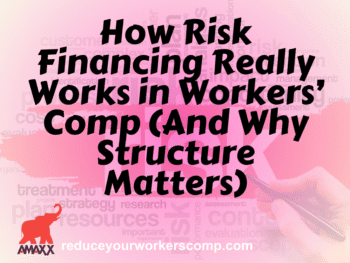
Employers do not want to sacrifice service for cost so here are five tips to be mindful of when dealing with the lowest bidder.
1-The lowest bidder may have the least amount of staff
Less staff equals less cost. Less cost means the bidder can offer a lower premium and still make a profit on the claim ratio — premium collected vs claim expense paid out.
Fewer adjusters to handle more claims are good claims adjuster’s biggest enemy — high pending claim count. Get to know your claim adjusters and see what their pending caseload looks like. The higher the caseload, the more likely something will fall through the cracks. You do not want it to be your claims.
Click Link to Access Free PDF Download
“How to Calculate Your Minimum Experience Mod, Controllable Premium & the Revenue Impact”
2-All the adjusters may be in one location
You want an adjuster who will be on top of all local aspects of your claims. Adjusters in your local jurisdiction know about local doctors, judges, attorneys, vendors, etc. They know the good from the bad. Adjusters in other states may not be as privy to this information, and that can prolong a claim or affect the compensability. If you do business in California, and your adjuster is in Florida, the adjuster can miss local information crucial to the claim.
3-The lowest bidder may want any premium possible
Some carriers need premium dollars so badly; they underbid their competition just to collect premiums. They gamble on not paying off on a severe workers comp claim under their coverage. You might get decent service, but the stereotype is that the lowest bidder from the smallest carrier usually results in mediocre service to the employer. Make them prove this wrong.
4-Does low bidder have a poor reputation?
Ask these questions of your peers, broker and others you trust:
- How does this carrier stack up against their competition?
- Are they known for denying every case or settling every case?
- Do they have poor communication?
- Do other employers avoid this carrier at all costs?
- Are they familiar to local judges pre-conditioned on how to decide the case?
- Does the carrier pair underbidding premiums with poor adjusting?
- Does the plaintiff’s attorney know your carrier settles and does not push cases to trial? If so, that means anyone coming into their law office with a disputed workers comp claim will ask for the moon – benefiting the claimant and the attorney, but not you, the employer.
FREE DOWNLOAD: “How to Calculate Your Minimum Experience Mod, Controllable Premium & the Revenue Impact”
5-Make sure your broker provides broad spectrum of pricing
At renewal of your workers comp insurance policy, ask for a spectrum of premium costs from cheapest to most expensive, from a variety of carriers. Agents affiliated with only a few carriers (or only one) limit an employer’s choices. If you only get two choices, and you choose the cheapest, you may be missing another carrier perhaps slightly more expensive, but with a better reputation for service.
Do your homework. Look around, do some research, ask people in the business. Most carriers have established a reputation. Find out how they do business. You want to be represented by the best of the best. You do not cut corners in your business and you do not want a carrier cutting corners at your expense.
Summary:
Even if a carrier has a lower price than their competition it does not necessarily mean you will get poor claims service; but, history shows a good reputation is not always on the side of the lowest bidder when it comes to handling claims. Do your research. Ask questions. Make sure the carrier you select will work diligently on your behalf. You have enough to worry about as an employer; do not make your insurance needs another item on the list.
 Author Michael Stack, CEO Amaxx LLC. He is an expert in workers’ compensation cost containment systems and helps employers reduce their workers’ comp costs by 20% to 50%. He works as a consultant to large and mid-market clients, is a co-author of Your Ultimate Guide To Mastering Workers Comp Costs, a comprehensive step-by-step manual of cost containment strategies based on hands-on field experience, and is the founder & lead trainer of Amaxx Workers’ Comp Training Center, which offers the Certified Master of Workers’ Compensation national designation.
Author Michael Stack, CEO Amaxx LLC. He is an expert in workers’ compensation cost containment systems and helps employers reduce their workers’ comp costs by 20% to 50%. He works as a consultant to large and mid-market clients, is a co-author of Your Ultimate Guide To Mastering Workers Comp Costs, a comprehensive step-by-step manual of cost containment strategies based on hands-on field experience, and is the founder & lead trainer of Amaxx Workers’ Comp Training Center, which offers the Certified Master of Workers’ Compensation national designation.
Contact: mstack@reduceyourworkerscomp.com.
Workers’ Comp Roundup Blog: http://blog.reduceyourworkerscomp.com/
©2022 Amaxx LLC. All rights reserved under International Copyright Law.
Do not use this information without independent verification. All state laws vary. You should consult with your insurance broker, attorney, or qualified professional.


















